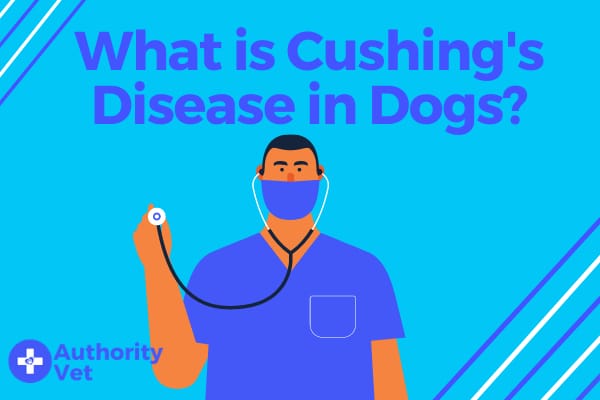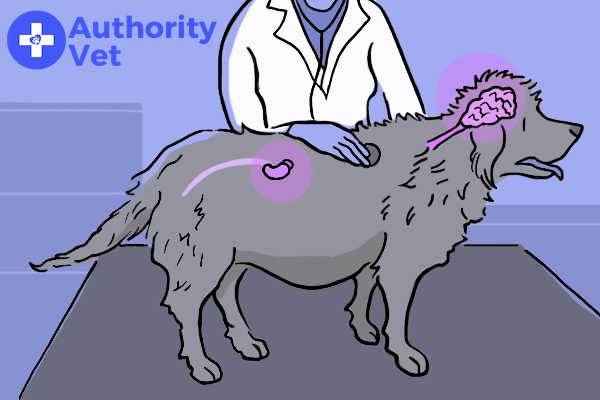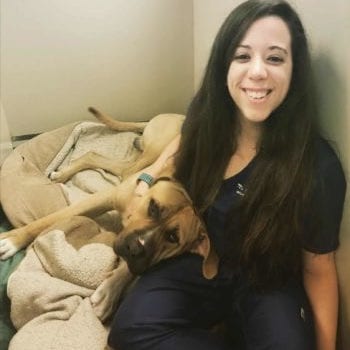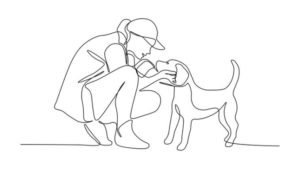Cushing's disease occurs when your dog produces too much cortisol. Cortisol is a naturally occurring hormone that regulates your dog's weight and blood sugar.
Diagnosed in older dogs, high cortisol levels, known as hypercortisolism, can reduce your dogs' ability to fight off infections and how they respond to stress.
Your dog may have Cushion's disease if they are:

There are a few different forms of cushing's disease that your dog can have.
The most common form of Cushing's disease is pituitary gland dependent. This type of Cushing's is noted in 80-85% of dogs with this diagnosis. The pituitary gland is found between the hypothalamus and the pineal gland at the base of the skull. Roughly pea size, the pituitary gland regulates most endocrine glands in the body and controls hormone functions.
Adrenal dependent Cushing's is tumor-derived and develops within the adrenal gland that is found connected to the kidneys. 15-20% of dogs that are diagnosed with Cushing's disease will be adrenal dependent. The adrenal glands produce various hormones that help regulate metabolism, blood pressure, immune system, response to stress (fight or flight response), and other essential functions.

Iatrogenic Cushing's syndrome occurs in dogs who have taken steroids for an extended period of time. This condition is often noted in dogs undergoing treatment for chronic asthma, rheumatoid arthritis, and other inflammatory diseases where a steroid was chosen over a nonsteroidal anti-inflammatory drug (NSAID). Iatrogenic Cushing's syndrome will resolve over time once the steroids are discontinued. Keep in mind that the original disease being controlled by the steroids will return once the medication is stopped.
Ectopic Cushing's syndrome occurs when a cortisol secreting tumor is present in the adrenal glands, pituitary gland, or elsewhere in the body. These tumors secrete adrenocorticotropic hormones (ACTH) that overstimulate the already elevated cortisol levels.
Cushing's disease requires a definitive diagnosis before treatment can be started. There is not a Cushing's specific test that can be performed on your pet. Instead, your Vet will do a few tests to ensure they can treat your dog appropriately.
The initial tests your Vet will recommend include a urinalysis to check for a urinary tract infection (UTI) and dilution of the urine and blood work to check for various liver enzymes such as alkaline phosphate and if their glucose levels are elevated.
If these tests support a Cushing's diagnosis, your Vet will have you complete one of the two following tests:
If either of these tests is elevated past their normal range, your dog will have a confirmed Cushing's disease diagnosis. Your Vet may then recommend an ultrasound to evaluate the abdominal cavity, including the adrenal glands, for any abnormalities such as tumors. Your Vet will determine the best treatment method for your dogs' diagnosis by completing an ultrasound.
Medications such as Trilostane (Vetoryl) can be used to control pituitary gland derived Cushing's disease or for those dogs who have inoperable cortisol producing tumor such as one that can be found in their adrenal gland as this can be a dangerous and challenging operation. Trilostane requires regular check-ups and blood work to ensure the drug is working as intended.
In the case where your dog has adrenal dependent Cushing's, and your Vet can altogether remove the tumor, your dog will be cured of Cushing's disease in its entirety. If the cancer has metastasized or spread to other parts of their body or has other severe health conditions, surgery may not be a viable option.
If your dog has been diagnosed with Cushing's disease, you must follow your dog's treatment plan. Monitor your pets' behavior and note any symptoms. Please continue to give your dog their medication as prescribed. Remember that Cushing's disease is not a death sentence- Though your pet may need to be on drugs for the rest of their life, your dog can lead a very normal and active lifestyle while having Cushing's disease.

Nicole is a Licensed and Registered Veterinary Technician in Washington and California. She is the immediate past president of the Washington State Association of Veterinary Technicians and holds multiple advanced degrees in veterinary technology, psychology, and human health care management. She has worked in private and corporate settings. Nicole manages an ambulatory surgery practice based in the Puget Sound area of Washington. When not working in the clinic, Nicole is a frequent lecturer at various national and international conferences and meetings. She is also a tireless advocate for the appropriate use of regenerative therapies in veterinary medicine.
